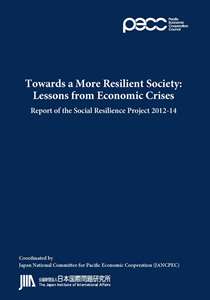ISBN 978-4-8193-0212-8
122 pages
The Japan Institute of International Affairs (JIIA)
Table of Content
1. Social safety nets and inclusive growth in Mongolia (Sonintamir Nergui and Myagmarsuren Sanaakhorol)
2. Social safety nets in Chile (German A. King and Felipe Allard)
3. Social protection as an entry point to inclusive growth in Myanmar (Khine Tun)
4. Social protection in Cambodia (Vannarith Chheang)
5. Reflection on the housing security program in China (Wang Jing)
6. Social security in Colombia (Miguel Urrutia Montoya)
Foreword
Two financial crises have hit the region during the past two decades. Being aware that we must consider not only economic rescue policies in the short term but also the resilience of social infrastructure against shocks from economic crises in the long term, the Japan National Committee for Pacific Economic Cooperation (JANCPEC) launched the Social Resilience Research Project (SR Project) in 2010 as a Pacific Economic Cooperation Council (PECC) International Project.
The SR Project is designed to shed light on the importance of social safety nets and to closely examine the mechanisms of their roles in the domestic economy. In addition, the SR Project is the first ambitious attempt by the APEC/PECC family to discuss social policy dimensions, as APEC and PECC have traditionally focused on trade and investment liberalization issues.
The first and second SR Projects have a four-fold focus: pension, health insurance, unemployment insurance, and macro-analysis. The first final report, entitled “Towards a More Resilient Society: Lessons from Economic Crises,” was published in October 2010, and the second final report was published in March 2012.
Since 2012, we have attempted to conduct a country study of each Asia-Pacific economy to examine its current social security systems and the challenges for future development and reforms. The studies also include those aspects of social security systems that help realize inclusive growth and create resilient societies. In the Asia-Pacific region, the economic and social circumstances in each economy are significantly different. Thus, individual country studies will be useful to identify salient issues and particular challenges that need to be addressed in the respective economies.
In this report, the SR Project 2012-2014 covered as country cases Chile, Mongolia, Myanmar, Cambodia, China and Columbia. The views expressed herein are the personal views of the individuals indicated, and do not necessarily reflect the views of PECC and The Japan Institute of International Affairs (JIIA). I hope that these inputs will prove useful in showing the way toward resilient societies and sharing best practices among member economies.
September 2015

